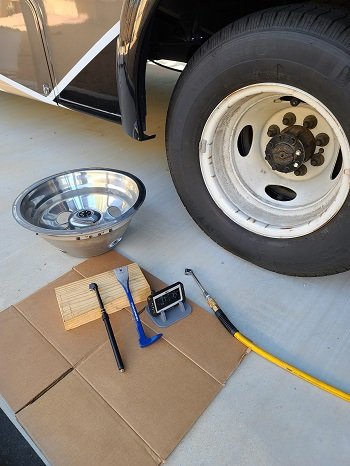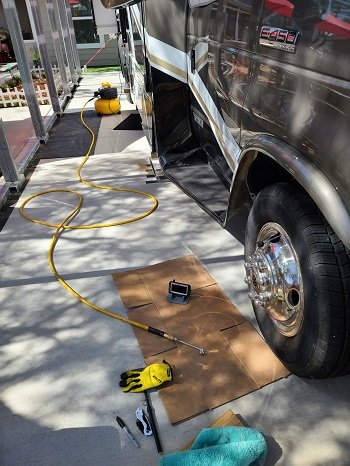X
X-Roughneck
Guest
I always like to run the Tire Pressure Monitor a couple days before departing to make sure I roll with proper pressure. I like Max or near. I need to start eXperimenting with Pressures within the inflation window.
I guess I am so fearful of building pressure with a under inflated tire, I will just add a little more "Perceived" Roughness to the ride by riding on Hard, hopefully not to the point of crowing the tread to make for uneven wear.
In preparation for the current trip, I found I guess the last time I crossed the inner and outer monitor cap after I set it up. At least I did not have it on the TOAD... ;D
My TST-507 10 Banger, I find it will see all Vehicles here in the Garage or RV Port and makes it a breeze running around with this PanCake Compressor that I purchased after being persuaded by Gary this was a good one. This Compressor will generate a 6 Gal tank Pressure of 150 PSI.
I have painted a small job too big for Rattle Can. It will generate some sweat but for short use I paint with it too.
QUESTION: What does the board think about the Cost of Depleting all the air and Filling the Tires with Nitrogen?
JD
I guess I am so fearful of building pressure with a under inflated tire, I will just add a little more "Perceived" Roughness to the ride by riding on Hard, hopefully not to the point of crowing the tread to make for uneven wear.
In preparation for the current trip, I found I guess the last time I crossed the inner and outer monitor cap after I set it up. At least I did not have it on the TOAD... ;D
My TST-507 10 Banger, I find it will see all Vehicles here in the Garage or RV Port and makes it a breeze running around with this PanCake Compressor that I purchased after being persuaded by Gary this was a good one. This Compressor will generate a 6 Gal tank Pressure of 150 PSI.
I have painted a small job too big for Rattle Can. It will generate some sweat but for short use I paint with it too.
QUESTION: What does the board think about the Cost of Depleting all the air and Filling the Tires with Nitrogen?
JD


